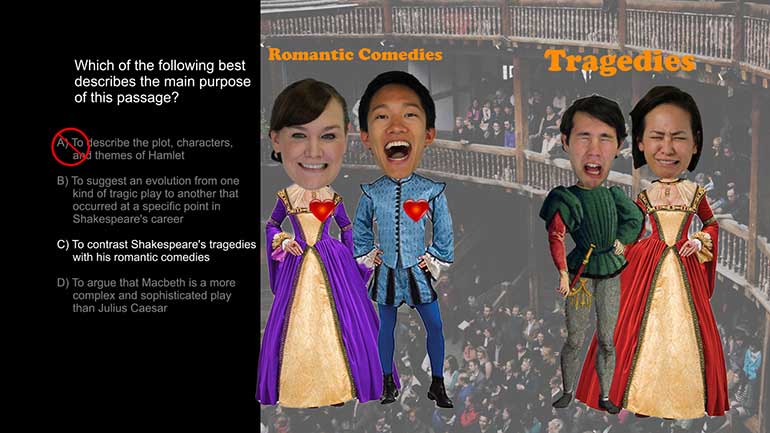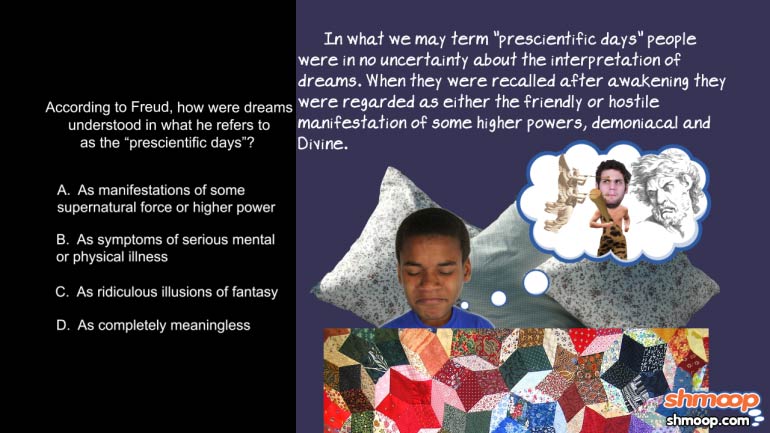ShmoopTube
Where Monty Python meets your 10th grade teacher.
Search Thousands of Shmoop Videos
ACT Reading 1.7 Humanities Passage 271 Views
Share It!
Description:
ACT Reading: Humanities Passage Drill 1, Problem 7. Which of the following characters is specifically mentioned as a personification of "horror and dismay" in Shakespeare's later tragedies?
Transcript
- 00:04
Here's your Shmoop du jour, brought to you by Lady Macbeth. Co-founder of Macbeths,
- 00:09
a restaurant chain that strives to violently dethrone McDonalds as the king of fast food.
- 00:42
Which of the following characters is specifically mentioned as a personification of "horror and dismay" in Shakespeare's later tragedies?
- 00:57
Unless we remember this one off the tops of our heads, we might have to go back to the passage to get it right.
- 01:02
All of these characters could be seen as horrible and dismaying, so we might want to be sure
Full Transcript
- 01:06
we're in tune with Professor Bradley's opinion on the matter.
- 01:09
Let's take a look at (C).
- 01:11
Richard the third does all kinds of bad stuff to get the throne of England and doesn't
- 01:15
sit on it too long before he gets... skewered.
- 01:18
However, the passage mentions none of these details. Instead, it specifically mentions
- 01:23
the fact that Richard III was one of Shakespeare's earliest tragedies.
- 01:27
We're sure it doesn't fit the bill here, because we know from the question that we're
- 01:31
looking for one that came later.
- 01:33
Does (D) have it right?
- 01:35
Brutus does conspire with a bunch of other dudes to kill his pal Caesar, because he feels
- 01:39
it was the right thing to do.
- 01:41
Still, though, this is not the character Bradley is referring to.
- 01:44
Let's take a look at choice (B)
- 01:47
Claudius from Hamlet kills his brother by pouring poison in his ear, then takes his
- 01:52
brother's throne and marries his brother's wife.
- 01:55
Yet again, this apparently isn't horrible and dismaying enough for Professor Bradley.
- 02:01
In lines 86 through 88, the Professor specifically mentions Lady Macbeth as an example of Shakespeare's "super bad guys."
- 02:09
According to the Professor, she's so evil that we don't sympathize with her at all.
- 02:16
This makes choice (A) the correct answer.
- 02:18
Bradley should probably be careful saying this kind of stuff about Lady M.
- 02:21
She's really not someone you want on your bad side...
Up Next
ACT Reading 1.5 Social Science Passage. Based on its context in the passage, which of the following would be the best definition for the word...
Related Videos
ACT Reading: Humanities Passage Drill 1, Problem 1. Which of the following best describes the main purpose of this passage?
ACT Reading: Natural Science Passage Drill 1, Problem 1. Which of the following best describes the overall purpose of this passage?
ACT Reading Prose Fiction Drill 1, Problem 1. Which of the following best describes the overall purpose of this passage?
ACT Reading: Social Science Passage Drill 1, Problem 1. According to Freud, how were dreams understood in what he refers to as the "prescienti...




